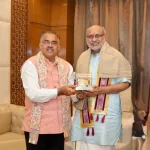Recently, I was going through a booklet on Ramadhan – written by some doctors from UK and thought to write about such important topic to let our readers know about the same and encourage fasting as a means of great salvation– for overall health –physical, social, mental and more importantly spiritual.
Broadly speaking, what actually happens inside the body while fasting, describes the ‘physiology of fasting'(in medical terms). To make it clearly to understand, the changes that occur in the body in response to fasting depend on the length of the continuous fast. Technically, the body enters into a fasting state eight hours or so after the last meal, when the gut finishes absorption of nutrients from the food.
In the normal state — body glucose — which is stored in the liver and muscles, remains the body’s main source of energy and during a fast, this store of glucose is used up first to provide energy. Later in the fast, once the stores of glucose run out — fat becomes the next store source of providing energy for the body. Moreover, small quantities of glucose are also produced through other mechanisms in the liver.
One should understand that only with a prolonged fast of many days to weeks continuously without eating anything in between, the body eventually turns to protein for energy. This is the short and technical description of what is commonly known as ‘starvation’ in medical terms, which is clearly unhealthy for one’s body — as it involves protein being released from the breakdown of muscle, which is why people who starve look emaciated and become very weak.
While the Ramadan fast only extends from dawn till dusk — there is ample opportunity to replenish energy stores at pre-dawn and dusk meals. This provides a progressive, gentle transition from using glucose to fat as the main source of energy and prevents the breakdown of muscle for protein.
Moreover, the use of fat for energy aids weight loss, preserving the muscles, and in the long run reduces one’s cholesterol levels. As obesity(weight gain) is considered one of the crucial risk factor’s for the development of many lifestyle diseases– like diabetes, hypertension, heart diseases including others. So while fasting during Ramadan — weight loss results in better control of diabetes, reduces blood pressure and the chances of heart diseases.
More to say, a detoxification process also seems to occur — as any toxins stored in the body’s fat are dissolved and removed from the body. And after a few days of the fast, higher levels of certain hormones appear in the blood (endorphins) — resulting in a better level of alertness and an overall feeling of general mental well-being.
It is pertinent to note that healthy cum balanced food and fluid intake is crucial between fasts. The kidney is very efficient at maintaining the body’s water and salts, such as sodium and potassium. However, these can be lost through sweating. Therefore, meals must contain adequate levels of ‘energy food’, such as carbohydrates and some fat– a balanced diet with adequate quantities of nutrients, salts and water.
While talking about the benefits of fasting — it is not only a physical but also a spiritual exercise that has many long lasting benefits:
Heightening consciousness of Almighty Allah
Fasting helps one to become less pre-occupied with bodily appetites, and gives one’s heart and mind the freedom to reflect upon deeper spiritual relationship with Almighty Allah and fellow human beings. Broadly, it makes a person capable to develop sustained consciousness of Almighty Allah (Taqwa).
Developing healthy lifestyle
Fasting person learns restraint, and only responds to hunger and thirst in the heightened level of consciousness and discipline. Fasting enables a person to acknowledge the value of food. In the Holy Qur’an “healthy and wholesome food” is described as the best of provisions — thus fasting helps a person to choose a healthier lifestyle by making small yet lasting healthy changes to their daily diet.
Encouraging compassion and charity
Fasting enables a person to think of those who are in need, who may be fasting but have no food at the start or the end of their fast, those whose little children are also having to go hungry because of poverty. The Prophet Muhammad (SAW) described Ramadan as “the month of mercy”. His beloved companions observed, “The Prophet Muhammad (SAW) was the most generous of people, but he would be his most generous during Ramadan…”(Sahih al-Bukhari)
Developing community spirit
During Ramadan, the one who fasts has highest levels of concern for the well-being of the community – rich and poor, intellectuals and labourers. Community spirit is promoted as people start fasting at the same time and break their fast at the same time, and reflect together through longer prayers and deeper devotions. Besides, it is greatly encouraged that families invite each other to break their fast together.
Breaking bad habits
Ramadan is an ideal time to break bad habits, to reflect on one’s personality and to improve and positively develop one’s character. It is an opportunity to make healthy lifestyle choices — being mindful of how one fast and how one break their fast can help to improve one’s overall health – both physical and mental.
Quitting smoking
Ramadhan is a good opportunity to quit smoking. Smoking is wasteful and seriously injurious to health. Almighty Allah has entrusted us with a healthy body, and it is a violation to knowingly and willingly harm it. Ramadan provides a great opportunity to make healthy lifestyle choices and amend many bad habits — and smoking is indeed one of them.
Renewing spirit
Abstention for long hours can be very hard physically and spiritually. However, by the end of the long month one should feel cleansed and with a renewed spirit. Prophet Muhammad (PBUH) stressed in a number of sayings — fasting is not merely “abstention from eating and drinking, but also from vain speech and foul language”…(Sahih al Bukhari). Those who fast but make no change to their lives except delaying a meal cannot really expect to become any different in their behaviour during or after Ramadan. Therefore, fasting is about, much more than just giving up food and drink and hoping to lose a couple of pounds. By fasting, a person reflects, acts and betters his or her character.
(The Author is a Medical Doctor, Columnist and Public speaker. He can be mailed on: [email protected])





